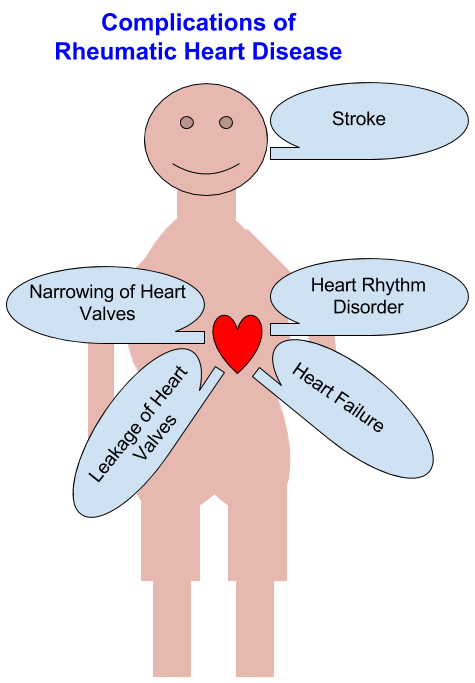Rheumatic heart disease

What is rheumatic heart disease?
Rheumatic heart disease is heart disease secondary to one or more attacks of rheumatic fever. Rheumatic fever involves mainly the heart valves and produces long lasting damage. In the initial stages the valve becomes leaky (regurgitation). Later on the valve becomes distorted and thickened, narrowing the orifice (stenosis). The valves on the left side of the heart (mitral valve and aortic valve) are more frequently involved than that on the right side (tricuspid valve and pulmonary valve).
What are the symptoms of rheumatic heart disease?
Symptoms of rheumatic heart disease depends on the valves which are involved and the type of involvement (leak or obstruction). Leaky valves cause a volume overload on the related heart chambers leading to increased awareness of heartbeat (palpitation) and sometimes breathlessness. Obstruction to valves produces breathlessness and sometimes dizziness when sufficient amount of blood cannot be pumped out into the circulation.
Both these symptoms are more likely to occur during exertion as the oxygen requirement of the body goes up and requirement for blood is more. In advanced cases, fluid may collect in the lungs, body cavities and under the skin. Fluid collection in the skin usually is more in the dependent regions (legs and ankles). Face may become puffy with severe heart failure.
Can heart rhythm be upset by rheumatic heart disease?
Enlargement of upper chambers of the heart (right atrium and left atrium) can upset the rhythm of the heart so that an irregular rhythm known as atrial fibrillation occurs. This can lead to a fast irregular rhythm and exacerbate heart failure. When there is atrial fibrillation, the upper chambers cannot contract effectively and blood pooling in them can produce clots. These clots can move to other parts of the body, causing obstruction to blood vessels (embolism). Obstruction of blood vessels of the brain can cause weakness of one or more limbs (stroke).
Can rheumatic heart disease be treated?
In early stages medications are useful to prevent the manifestations and complications of rheumatic heart disease. A severely damaged valve can be surgically replaced by an artificial valve (valve replacement). An obstructed valve can be opened even without surgery using balloons attached tubes known as balloon catheters, introduced through the skin into blood vessels. This procedure is known as balloon valvotomy or balloon valvuloplasty. This can be done under local anesthesia in a special suite known as cardiac catheterization laboratory equipped with cine X-ray equipment.




Very useful for students and beginners.
Thank you very much sir, for your appreciation!